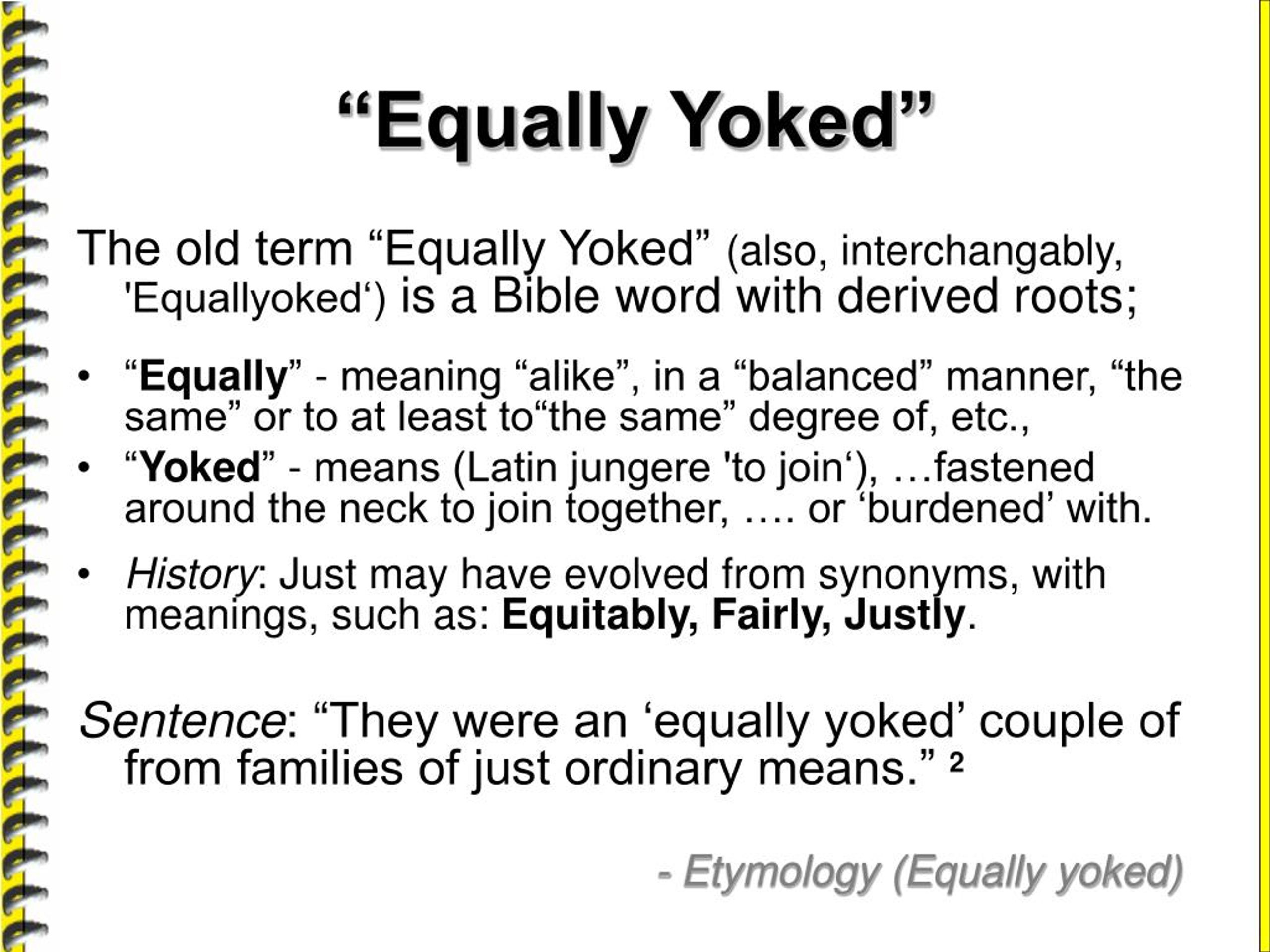Does the concept of being "equally yoked" still hold relevance in the modern world, or is it a relic of a bygone era? The enduring power of this ancient metaphor lies in its profound understanding of compatibility, shared values, and the potential for both collaborative strength and detrimental division in any partnership.
The phrase "equally yoked," originating from the biblical text of 2 Corinthians 6:14, serves as a potent image. It speaks to the pairing of oxen, where the yoke, a wooden frame, binds them together to pull a plow. The implication is clear: if two oxen are not of similar strength and temperament, the plowing will be inefficient, arduous, and potentially damaging. One ox may struggle, be injured, or refuse to pull, while the other is strained, leading to a failed or incomplete task. This imagery extends beyond the literal; it offers a timeless warning about the importance of compatibility in relationships, particularly those involving shared responsibility and commitment.
The core of the "equally yoked" concept centers on the idea of shared belief systems, moral values, and life goals. It suggests that individuals involved in a partnership, whether romantic, business-related, or even in a close friendship, should be aligned in their fundamental perspectives on life. This alignment facilitates cooperation, mutual support, and a shared vision for the future. When two individuals hold diametrically opposed values, the strain on the relationship can be immense. The metaphorical plow becomes difficult to navigate, and the shared goals may be left unfulfilled. Disagreements become frequent, compromise difficult, and the overall trajectory of the partnership is likely to suffer.
Conversely, when individuals are "equally yoked" in their foundational beliefs, the potential for positive outcomes is significantly enhanced. They can support each other through challenges, celebrate each other's successes, and build a strong, resilient foundation for their shared endeavors. They understand and respect each other's core values, making it easier to navigate disagreements and work collaboratively toward common goals. The shared yoke becomes a symbol of strength, unity, and the potential for achieving more together than either individual could alone.
The interpretation of "equally yoked" has evolved over time. Initially, it was largely associated with religious beliefs, particularly within the context of marriage. The emphasis was on the importance of individuals sharing the same faith. While this remains a vital aspect for many, the concept has expanded to encompass a broader range of compatibility factors. These factors include:
- Values: Similar core beliefs about right and wrong, ethics, and moral principles.
- Goals: Shared aspirations for the future, including career ambitions, family plans, and lifestyle preferences.
- Communication Styles: The ability to communicate effectively, respectfully, and honestly.
- Temperaments: Compatibility in personality traits, such as introversion vs. extroversion, or the degree to which individuals are risk-averse.
- Financial Philosophies: Similar attitudes toward money, including spending habits, saving goals, and financial responsibility.
The modern understanding of "equally yoked" also considers the concept of personal growth. In a healthy relationship, both individuals support each other's development and evolution. They encourage each other to pursue their passions, overcome challenges, and strive for self-improvement. This mutual encouragement fosters a dynamic, supportive environment where both partners can flourish. However, it is crucial to acknowledge that people change over time, and even "equally yoked" couples may face challenges as their individual paths diverge. The ability to adapt, communicate openly, and continuously re-evaluate shared goals is essential for navigating these complexities.
The application of "equally yoked" extends beyond romantic relationships. Its applicable to business partnerships, close friendships, and even professional collaborations. Consider a business venture: two partners who share the same vision, work ethic, and financial goals are far more likely to succeed than partners who have conflicting objectives. Likewise, in a close friendship, individuals who share similar values, interests, and support systems are likely to experience a more fulfilling and enduring bond. The principle of "equally yoked" underscores the importance of identifying shared values and goals before committing to a significant endeavor with another person.
Consider a business partnership where the founders have vastly different approaches to risk. One is conservative, valuing stability and slow growth. The other is more aggressive, wanting rapid expansion and willing to take on significant debt. These fundamental differences are likely to generate tension, disagreement, and ultimately, hinder the success of the business. Conversely, a business partnership comprised of individuals who share similar values, a shared understanding of work ethics, a respect for professionalism and the goal of creating something sustainable has a much stronger chance of prosperity. This aligns with the 'equally yoked' principle, advocating for a harmonious and symbiotic relationship.
For many, the concept of "equally yoked" is not just a philosophical ideal but a practical guideline. Before making any significant commitment, it is essential to evaluate potential partners across a range of factors. The evaluation process is about open and honest communication, self-reflection, and a willingness to discuss difficult topics. Understanding one's own values, goals, and communication style is the first step. Following this, individuals can ask questions, observe behaviors, and engage in conversations to gain insight into the compatibility of potential partners.
The modern world offers a vast array of resources to aid in this evaluation process. Online dating platforms, pre-marriage counseling, personality tests, and in-depth conversations all contribute to the deeper understanding of shared values and goals. While these resources can be helpful, they are not a substitute for authentic connection and genuine effort. The ability to be vulnerable, to listen attentively, and to assess character over time remains essential.
The challenges of being "unequally yoked" are substantial. These can include constant conflict, a lack of understanding, and emotional exhaustion. When individuals hold different fundamental beliefs, disagreements are almost inevitable. This can lead to frustration, resentment, and a breakdown in communication. Moreover, a lack of mutual support can create feelings of isolation and loneliness. In extreme cases, an "unequally yoked" partnership can be emotionally damaging. These negative effects underline the importance of prioritizing compatibility and shared values.
The concept of "equally yoked" is not about creating carbon copies of individuals. It is about identifying fundamental compatibility, a shared understanding of values, and a willingness to work collaboratively. It is about acknowledging that differences will inevitably arise but that a strong foundation of shared beliefs can provide the necessary framework for navigating these complexities. This foundational approach to relationships promotes enduring partnerships, mutual support, and the potential to achieve more together than either individual could alone. Ultimately, the essence of being "equally yoked" remains a search for meaningful connection built upon shared values, mutual respect, and a common vision for the future.
The principles of equally yoked transcend any specific area of life, offering a universal framework for building successful, fulfilling relationships. Whether its a romantic partnership, a business venture, or a deep friendship, a foundation of shared values, mutual respect, and aligned goals is critical. The concept is not about finding someone who mirrors your every thought but rather about identifying someone who complements your strengths, supports your aspirations, and shares your core beliefs. By embracing the principles of "equally yoked," individuals can increase their chances of creating meaningful, lasting connections, and navigating the complexities of life with greater ease and purpose.
Let us turn our focus to the application of equally yoked in other real-world contexts. Consider the selection of a business partner. The success of any venture hinges on the collaboration and agreement of the individuals involved. The concept underscores the necessity of aligning interests and values to ensure a shared vision. For example, if one partner is primarily focused on short-term profits, while the other prioritizes long-term sustainability, the fundamental conflict could erode the partnership. A wise entrepreneur will thoroughly evaluate the potential partner's beliefs, work ethic, and risk tolerance, seeking a synergistic combination that balances all considerations. This careful selection process is the first step towards establishing a equally yoked partnership, where both individuals contribute to the collective success.
Equally important is the role of equally yoked in the professional domain. The selection of a mentor, a supervisor, or even a team member can be significantly influenced by the alignment of shared values and goals. A mentor, for example, should be someone who embodies the principles you aspire to emulate, a relationship built on trust, mutual respect, and a shared commitment to professional growth. When choosing a colleague, assessing the work ethic, communication style, and overall integrity are crucial. This assessment seeks a person who can provide support, and is supportive, contributing to a more productive and satisfying work experience. This is consistent with the principles of equally yoked, which highlights the importance of choosing people who will aid in your personal and professional development.


